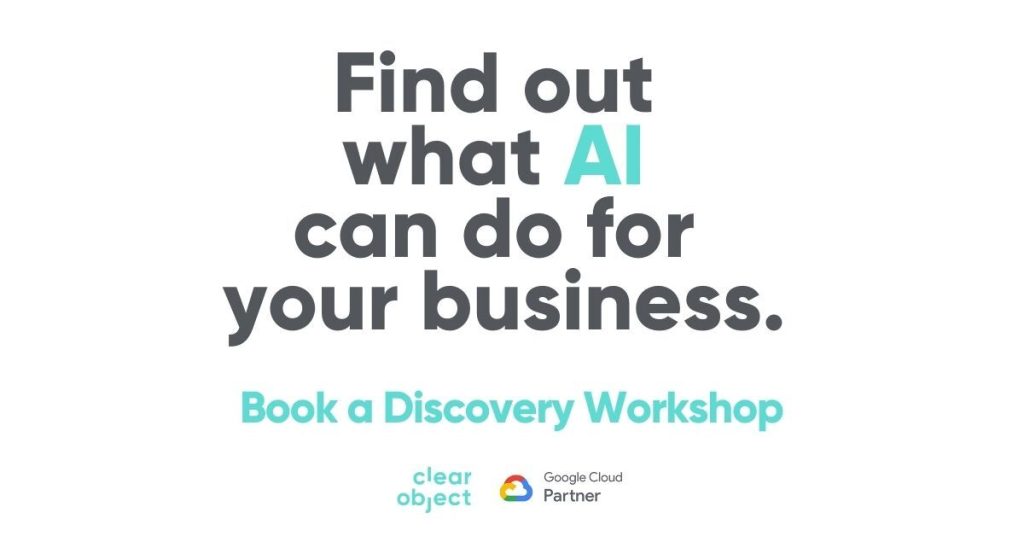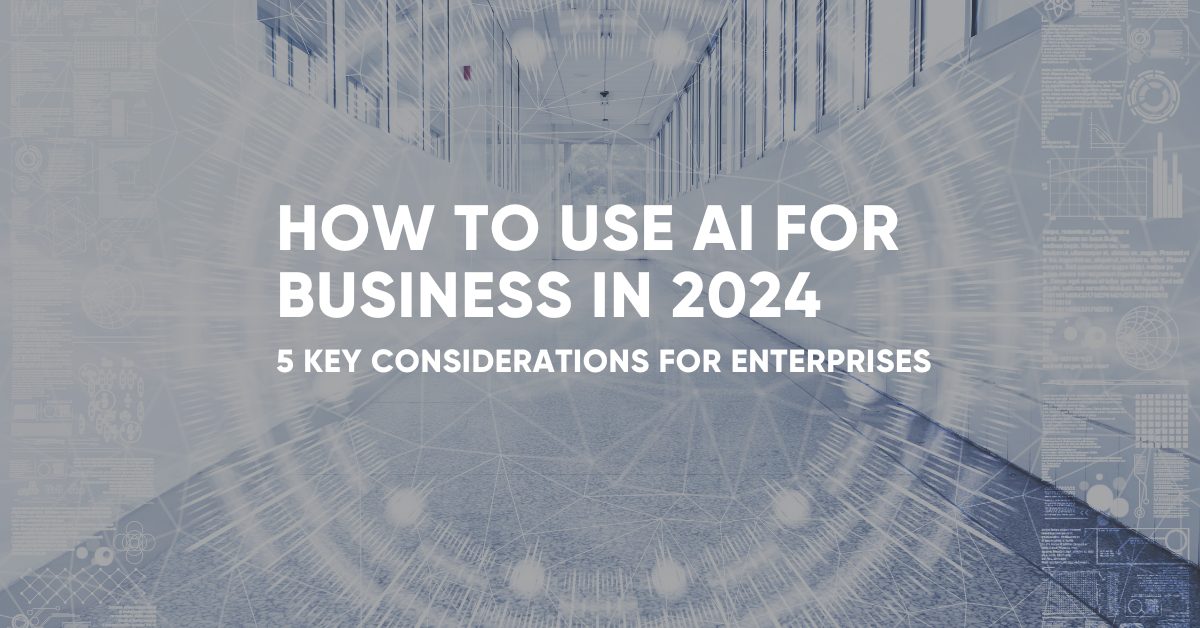With the public launch of ChatGPT in late 2022, Artificial Intelligence (AI) gained international attention. In 2023, companies have scrambled to integrate AI features into their existing products while new Artificial Intelligence businesses have sprouted up like weeds. As we enter 2024, AI stands out as a transformative force for enterprises. AI adoption is no longer a luxury; it’s a necessity for businesses looking to stay competitive, efficient, and innovative.
The key to success in integrating AI into your enterprise lies in understanding how to identify, test, and launch the best use cases specific to your business needs. While AI may seem intimidating, or out of reach, it doesn’t need to be. Here are five key considerations for enterprises looking to begin leveraging AI in 2024..
1. Define Your Objectives and Business Needs
Before diving headfirst into the world of AI, it’s crucial to understand your enterprise’s specific objectives and business needs. What problems are you trying to solve? What processes could be optimized or automated with AI? This initial step requires a deep dive into your organization’s core activities, identifying areas where AI can bring the most significant benefits.
The key to successful AI integration is a clear and well-defined strategy. Without a strong foundation, your AI initiatives may lack focus and fail to deliver meaningful results. To avoid this, work closely with your internal teams and external partners to assess your current processes and identify areas where AI can make the most impact.

2. Choose the Right AI Partner
Selecting the right AI partner is arguably one of the most critical decisions in your AI journey. While it’s essential to build internal AI expertise over time, working with experienced AI providers can accelerate your progress and reduce the risks associated with implementation. Here are some key criteria to consider when choosing an AI partner:
Expertise and Experience:
Look for partners with a proven track record of successful AI projects in your industry or similar domains. Experience matters, as it ensures they understand the unique challenges and opportunities your enterprise faces.
Customization and Scalability:
Ensure that the AI partner can tailor solutions to your specific needs. A one-size-fits-all approach rarely yields the best results. Your partner should be able to scale AI solutions as your business grows.
Ethical AI:
AI should be developed and used ethically. Choose a partner who adheres to ethical guidelines and data privacy regulations, promoting transparency, fairness, and responsible AI practices.
Support and Maintenance:
AI solutions require ongoing support and maintenance. Your partner should offer reliable post-implementation services to address issues, updates, and improvements.
Budget and ROI:
Consider the cost of partnering with an AI provider and weigh it against the expected return on investment. A trusted partner should help you understand the potential cost savings and revenue generation opportunities.
3. Data is the Foundation
AI systems thrive on data. To leverage AI effectively, you need a solid data foundation. Data quality, quantity, and accessibility are vital factors. Invest in data collection, storage, and management strategies to ensure your AI initiatives have access to the right data. Here are some tips to consider:
Data Cleanliness:
Ensure your data is clean and free of errors. Inaccurate or incomplete data can lead to flawed AI insights and predictions.
Data Security:
Protect sensitive data to maintain customer trust and comply with regulations. Implement robust security measures to prevent data breaches.
Data Infrastructure:
Invest in scalable data infrastructure to handle the increasing volume of data generated by your enterprise. Cloud solutions or on-premises systems may be necessary, depending on your needs.
Data Collaboration:
Encourage cross-functional teams to collaborate on data initiatives. This helps ensure that data-driven insights benefit various parts of your organization.

4. Understand the Regulatory Landscape
The use of AI is not without legal and ethical considerations. Regulations around AI are continually evolving, and enterprises must stay abreast of the changing landscape. Depending on your industry and geographical location, there may be specific rules and guidelines to follow. Key considerations include:
Data Privacy:
Understand and comply with data privacy regulations, such as GDPR, CCPA, or any industry-specific standards. Failing to do so can lead to severe penalties.
Bias and Fairness:
AI systems can unintentionally perpetuate biases present in the training data. It’s essential to monitor and mitigate bias in AI systems to ensure fairness.
Accountability:
Establish clear accountability for the AI systems in your organization. Understand who is responsible for AI-related decisions and actions.
Transparency:
Promote transparency in AI processes and decision-making. This not only helps in building trust but also aids in regulatory compliance.
5. Focus on Change Management
The successful integration of AI into an enterprise is as much about people as it is about technology. Change management is essential to ensure that your workforce embraces AI technologies. Here’s how to approach it:
Training and Education:
Invest in AI training and education for your employees. This not only includes technical skills but also the ability to work alongside AI systems effectively.
Communication:
Transparently communicate the goals and benefits of AI integration to your workforce. Address concerns and uncertainties openly.
Collaboration:
Encourage collaboration between AI systems and human teams. The goal is not to replace human workers but to augment their capabilities.
Monitor Progress:
Continuously monitor the impact of AI on your business processes and employee performance. Be open to feedback and adapt your AI strategy accordingly.
Adaptability:
Be prepared for cultural shifts within your organization. AI adoption may lead to changes in job roles, workflows, and responsibilities.
As we step into 2024, AI adoption is more vital than ever for enterprises looking to thrive in an increasingly competitive landscape. To embark on a successful AI journey, remember to start with a clear understanding of your business needs and objectives. Choose the right AI partner to guide you, and prioritize data quality, security, and accessibility. Stay informed about the regulatory landscape and focus on change management to ensure your workforce is ready to embrace AI technologies.
By taking these five key considerations into account, your enterprise will be well-prepared to leverage the power of AI in 2024 and beyond. The possibilities are vast, and the potential for innovation and growth is boundless for those who take this transformative step.
ClearObject can help you get started. Book a FREE 2024 AI Planning Workshop today!


